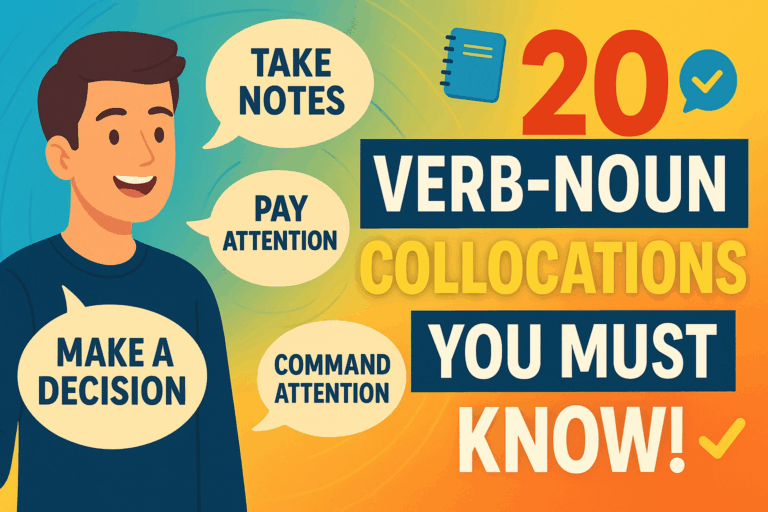If you’ve ever listened to native speakers and thought, “How do they sound so natural?”, the secret often lies in verb-noun collocations. These word pairs make English flow smoothly. Without them, even correct grammar can sound a bit off.
What Are Collocations?
Collocations are words that naturally appear together. They form familiar combinations that native speakers use without thinking. For example, we say “make a mistake” instead of “do a mistake.” Both are grammatically possible, but only one sounds right.
Why Collocations Matter
Using collocations correctly makes your English sound fluent and confident. They help you choose the right word combinations that fit naturally in real conversations. Mastering verb-noun collocations in particular boosts your ability to speak and write with ease.
Below are 20 powerful verb-noun collocations that’ll instantly upgrade your English. Each one includes its meaning and a clear example you can use right away.
1. Make an effort
Meaning: Try hard to do something.
Example: You should make an effort to arrive on time.
2. Take responsibility
Meaning: Accept that something is your duty or fault.
Example: He took responsibility for the project’s failure.
3. Do homework
Meaning: Complete school assignments or research.
Example: I always do my homework before dinner.
4. Give advice
Meaning: Offer helpful suggestions or guidance.
Example: My teacher gave me advice on how to improve my writing.
5. Catch a cold
Meaning: Become ill with a mild infection.
Example: She caught a cold after walking in the rain.
6. Pay attention
Meaning: Focus carefully on something.
Example: Pay attention to the road while driving.
7. Break a promise
Meaning: Fail to do what you said you’d do.
Example: He broke his promise and didn’t call back.
8. Set a goal
Meaning: Decide what you want to achieve.
Example: It’s smart to set a goal at the start of each year.
9. Keep a secret
Meaning: Do not tell anyone something private.
Example: She’s great at keeping secrets.
10. Run a business
Meaning: Manage or operate a company.
Example: They run a small bakery in town.
11. Draw attention
Meaning: Attract notice or focus.
Example: The new ad drew everyone’s attention online.
12. Lose control
Meaning: Fail to maintain order or composure.
Example: He lost control of the car on the icy road.
13. Gain experience
Meaning: Learn through practice or exposure.
Example: You’ll gain valuable experience from this internship.
14. Save money
Meaning: Keep money instead of spending it.
Example: She’s saving money for a new laptop.
15. Tell the truth
Meaning: Be honest about something.
Example: Always tell the truth, even when it’s hard.
16. Bear responsibility
Meaning: Accept the duty or blame for something.
Example: Managers bear responsibility for their team’s results.
17. Win approval
Meaning: Receive acceptance or positive feedback.
Example: The new design won the client’s approval immediately.
18. Raise a question
Meaning: Bring up something to discuss or consider.
Example: His comment raised an interesting question about culture.
19. Take notes
Meaning: Write down important information.
Example: Take notes during the lecture for review later.
20. Command attention
Meaning: Attract respect and focus through presence or authority.
Example: Her confident speech commanded attention from the audience.
Tips to Master Verb-Noun Collocations
- Notice them while reading or listening.
Pay attention (another verb-noun collocation!) to how native speakers combine words. - Create your own collocation notebook.
Group words by topic: business, emotions, travel, and keep adding examples. - Practice speaking aloud.
Repeat short sentences using different verb-noun collocations until they feel natural. - Use them in writing.
Try to include a few collocations whenever you write essays, captions, or emails. - Focus on context.
Some collocations change meaning slightly depending on how they’re used. For instance, “make an effort” and “put effort into” are close, but not identical.
Why Verb-Noun Collocations Are Key to Fluency
Think about it. Native speakers don’t pause to decide whether to say “do homework” or “make homework.” These combinations come automatically because they’ve heard them repeatedly. When you practice verb-noun collocations, your brain starts linking words in the same natural way.
The more collocations you know, the less you’ll need to translate in your head. Instead, words will come out as complete phrases, which is exactly what fluency feels like.
Common Mistakes to Avoid
- Translating directly from your language.
Some languages use different combinations, so “do a decision” might sound right in translation but not in English. - Using synonyms that break the collocation.
For example, you can “make an effort,” but not “create an effort.” - Memorizing isolated words.
Instead of learning “effort,” learn “make an effort.” It sticks better and sounds natural.
Practice Challenge
Try this quick activity:
Take five verb-noun collocations from the list above and write your own sentences with each. Then say them aloud. Notice how much smoother your English feels when you use the right word pair.
Example:
- I made an effort to eat healthier.
- She gave advice that changed my perspective.
- We set a goal to learn 10 new words each week.
- He drew attention with his bright jacket.
- They ran a business from their home.
You’ve just used five perfect verb-noun collocations naturally. That’s exactly how native speakers sound.
Final Thoughts
Mastering verb-noun collocations is one of the simplest ways to level up your English fluency. Each combination helps your speech and writing feel smoother, clearer, and more confident. Keep adding new ones to your vocabulary list, and soon you’ll notice your sentences flowing without hesitation.
The secret to sounding fluent isn’t about using complicated grammar; it’s about using the right combinations of words at the right time. And verb-noun collocations are your shortcut to getting there.
Click the link below to learn more about how to sound natural in conversations.
https://fluent-eng.com/native-slang-vs-simple-english-how-to-sound-natural/

